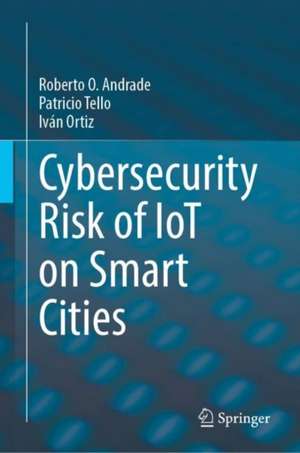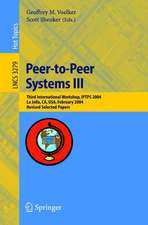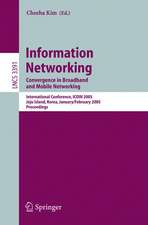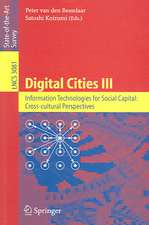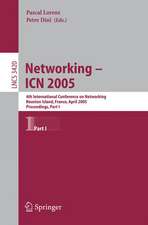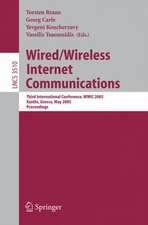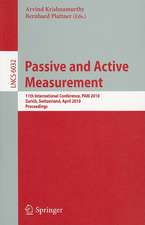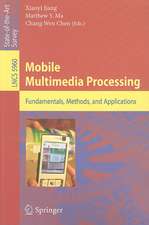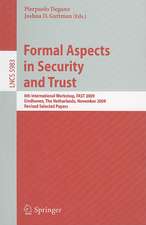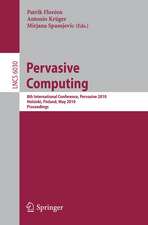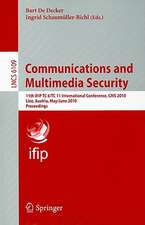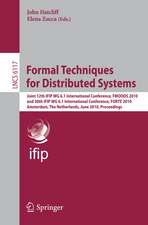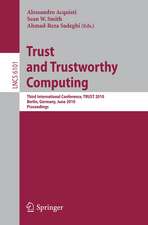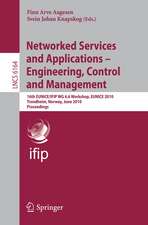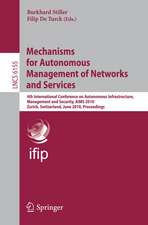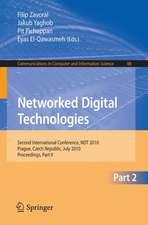Cybersecurity Risk of IoT on Smart Cities
Autor Roberto O. Andrade, Luis Tello-Oquendo, Iván Ortizen Limba Engleză Hardback – 4 dec 2021
Preț: 812.76 lei
Preț vechi: 1015.95 lei
-20% Nou
Puncte Express: 1219
Preț estimativ în valută:
155.54€ • 162.18$ • 129.27£
155.54€ • 162.18$ • 129.27£
Carte tipărită la comandă
Livrare economică 21 martie-04 aprilie
Preluare comenzi: 021 569.72.76
Specificații
ISBN-13: 9783030885236
ISBN-10: 3030885232
Ilustrații: XII, 87 p. 36 illus., 35 illus. in color.
Dimensiuni: 155 x 235 mm
Greutate: 0.32 kg
Ediția:1st ed. 2021
Editura: Springer International Publishing
Colecția Springer
Locul publicării:Cham, Switzerland
ISBN-10: 3030885232
Ilustrații: XII, 87 p. 36 illus., 35 illus. in color.
Dimensiuni: 155 x 235 mm
Greutate: 0.32 kg
Ediția:1st ed. 2021
Editura: Springer International Publishing
Colecția Springer
Locul publicării:Cham, Switzerland
Cuprins
Chapter. 1 Cybersecurity Risks of IoT on Smart Cities.- Chapter. 2 Uncertainty and its role in IoT risk management.- Chapter. 3 Risk methodologies for IoT on smart cities.- Chapter. 4 Decision-making based on risk assessment on smart cities.- References.
Notă biografică
Roberto Omar Andrade is Master in Management in Network and Telecommunications from Escuela Politécnica del Ejército, Master in Big Data and Business Intelligence from Universidad Juan Carlos III, and Engineer in Electronics and Telecommunications from Escuela Politécnica Nacional (EPN). He has been Director of Technology, Information Security Officer, Administrator of Data Center and Communication Networks in public and private institutions. He is a certified CCNA, CCNP, CCNA Security and Cyber-ops instructor since the year 2010. He has been certified in Ethical Hacking and Incident Management and Response, ISO 27001, COBIT. He is member of the Data Analytics Research Lab and the Smart Cities and IoT Lab at EPN since the year 2019, researching on the security aspects of IoT systems, cognitive security techniques and the application of data analytics in cybersecurity. He has been a reviewer of articles for Springer, IEEE Access, and several academic conferences. And He is collaborator of the ITU and IEEE in smart city guidelines.
Luis Tello-Oquendo received the electronic and computer engineering degree (Hons.) in 2010, the M.Sc. degree in telecommunication technologies, systems, and networks, and the Ph.D. degree in telecommunications from Universitat Politècnica de València (UPV), Spain, in 2013 and 2018, respectively. From 2013 to 2018, he was Graduate Research Assistant with the Broadband Internetworking Research Group, UPV. From 2016 to 2017, he was a Research Scholar with the Broadband Wireless Networking Laboratory, Georgia Institute of Technology, Atlanta, GA, USA. He is currently an Associate Professor with the College of Engineering, Universidad Nacional de Chimborazo, Ecuador. He has actively participated in several research projects focused on applying technologies such as wireless software-defined networks, 5G and beyond cellular systems, Internet of Things, machine learning, cybersecurity. He is a member of the Institute of Electrical and Electronics Engineers (IEEE) and the Association for Computing Machinery (ACM).
Iván Ortiz Garcés received a Masters in Communications Networks (Pontificia Universidad Católica del Ecuador PUCE). experience in administration, coordination and supervision of projects of LAN, WAN, IOT, Smart Cities, redundancy management for critical systems and infrastructure with high availability, Industrial telecommunications systems with transmission of information in real time through Fiber Optic, perimeter security, Computer Forensics, management of WINDOWS and LINUX Server Operating Systems as well as Virtualization and IP Telephony.
Experience in process audits for the implementation of Quality Management Systems ISO 9001, Information Security ISO 27001, Planning, Execution, Monitoring and Control of Projects. University Professor in charge of Community Linkage Projects, in addition to the Administration of the Experimental Data Center and Cybersecurity Laboratory.
He currently works as a full-time teacher of the Information Technology Engineering career. From the University of the Americas.
Iván Ortiz Garcés received a Masters in Communications Networks (Pontificia Universidad Católica del Ecuador PUCE). experience in administration, coordination and supervision of projects of LAN, WAN, IOT, Smart Cities, redundancy management for critical systems and infrastructure with high availability, Industrial telecommunications systems with transmission of information in real time through Fiber Optic, perimeter security, Computer Forensics, management of WINDOWS and LINUX Server Operating Systems as well as Virtualization and IP Telephony.
Experience in process audits for the implementation of Quality Management Systems ISO 9001, Information Security ISO 27001, Planning, Execution, Monitoring and Control of Projects. University Professor in charge of Community Linkage Projects, in addition to the Administration of the Experimental Data Center and Cybersecurity Laboratory.
He currently works as a full-time teacher of the Information Technology Engineering career. From the University of the Americas.
Textul de pe ultima copertă
This book covers the topics on cyber security in IoT systems used in different verticals such as agriculture, health, homes, transportation within the context of smart cities. The authors provide an analysis of the importance of developing smart cities by incorporating technologies such as IoT to achieve the sustainable development goals (SDGs) within the agenda 2030. Furthermore, it includes an analysis of the cyber security challenges generated by IoT systems due to factors such as heterogeneity, lack of security in design and few hardware resources in these systems, and how they should be addressed from a risk analysis approach, evaluating the risk analysis methodologies widely used in traditional IT systems.
Caracteristici
This book addresses the limitations of traditional risk analysis methodologies These can be used in traditional IT systems in IoT environments This book covers aspects considered for risk analysis methodologies from perspective of IoT systems security
